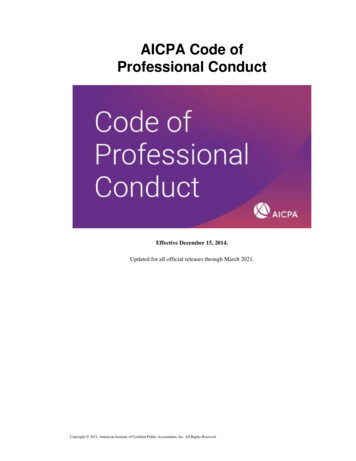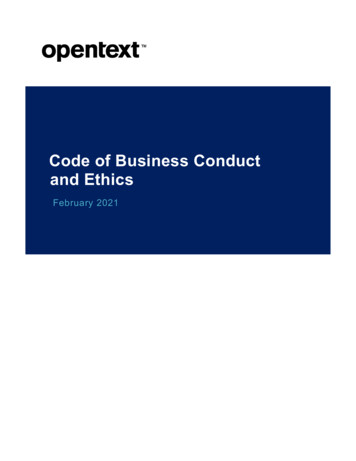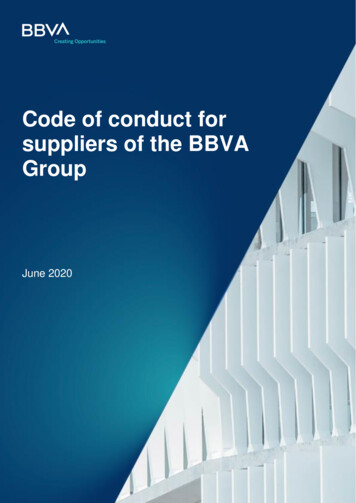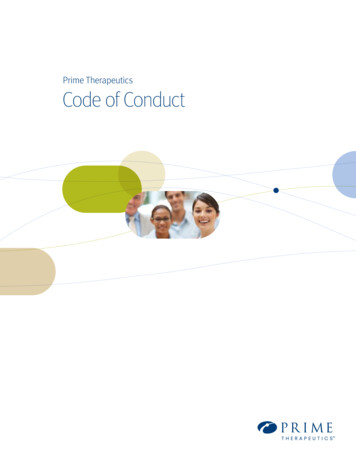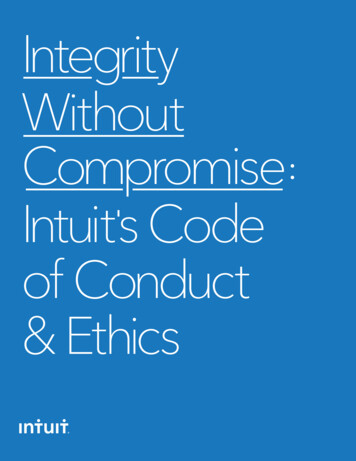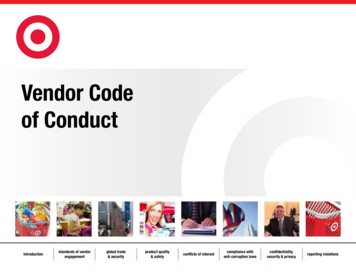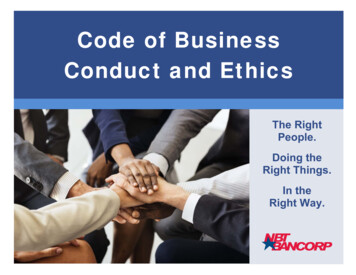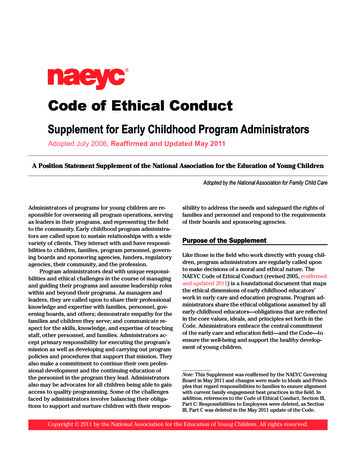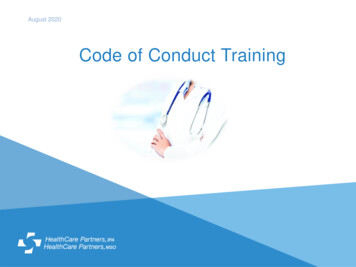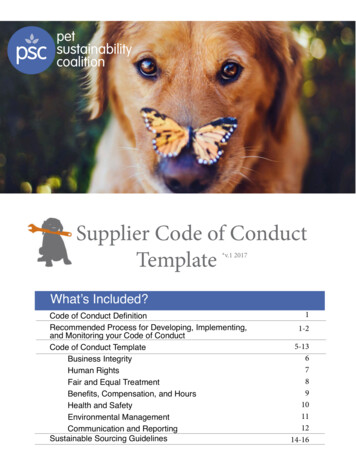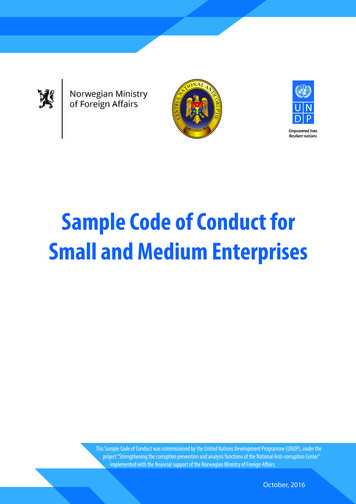
Transcription
Sample Code of Conduct forSmall and Medium EnterprisesThis Sample Code of Conduct was commissioned by the United Nations Development Programme (UNDP), under theproject “Strengthening the corruption prevention and analysis functions of the National Anti-corruption Center”implemented with the nancial support of the Norwegian Ministry of Foreign Affairs.October, 2016
Background to the Code of ConductPrinciples of Fair, Transparent and Legal PracticesEstablishing the Code of Conduct shall be considered one of the several useful instruments of an inclusive strategyand holistic policy to ght corruption in the private sector. The Code of Conduct consists in a set of principles onconducting business aimed at small and medium enterprises (SMEs), having the goal to protect their business andinform the employees and stakeholders of the SME's business objectives and expectations. The Code neithersubstitutes nor contests the Moldovan legislation. Acknowledging the rule of law supremacy, it sets up the ethicaland behavioral rules for the company's shareholders, management and employees. The ultimate goal of the Codeof Conduct is to help SMES to pursue a fair, transparent and legal business activity.Pre-assumptions for a persuasive Code of ConductThe Code of Conduct shall not follow the “develop and le” approach, meaning codes that exist on paper only, butare not commonly known or consistently implemented. This super cial approach would risk for both employers andemployees to become skeptical about the real utility of these codes, or even consider them counterproductively(the code could be perceived as an additional regulatory burden, as to create an opportunity for monitoringauthorities to in ict additional specious nes and/or demand for bribes). For a code to be effective, publicauthorities and private entities should ensure and commit to that: Senior officials support the code and lead by example; Staff are involved in all stages of code development and implementation; Support mechanisms are in place to encourage the use of the code; Compliance with the code may be taken into account in relation to career progression and promotion; Compliance with the code is monitored regularly through appropriate veri cation means; Code of conduct (and general corruption-awareness) training is regular and comprehensive; The organization continually promotes its ethical culture (the code is an important but not the only tool); The code is enforced through disciplinary action when necessary; The code is regularly reviewed for currency, relevance and accessibility; The code is devised with a style and structure that meets the particular needs of their organization; The code becomes an integral aspect for in uencing decisions, actions and attitudes in the workplace.Implement the Code of Conduct effectivelyWriting a code alone is not enough. Therefore, the Republic of Moldova needs to give consideration to ways ofmaking the Code effective in terms of its status and impact. Thus Moldova may decide to give the Code generallegitimacy and authority through officially adopting a model Code of Conduct, as well as stimulating and supportingSMEs and its senior management to comply with the Code's principles. States and private entities should publishthe code to clearly and coherently communicate to the media and general public the standards expected of officialsand employees, respectively, so that they know what are acceptable and unacceptable practices. There should beguidance on how the public may report breaches, and to whom, as well as the ability of the media to report in goodfaith on any breaches, without fear of retribution or retaliation. NAC shall have a primary role in these measures byadopting the model Code of Conduct, publishing it on its website and promoting the Code through public campaigns.Finally, NAC should scrutinize and monitor the implementation of the code – including regular reviews and surveysof public and private sectors to nd out the common knowledge of the code and its implementation as well as whatare the recurrent and most hideous challenges and pressures – and to publish periodic reports on whether entitiesare ful lling principles of the code.Adherence to and approval of the Code of ConductThe Code is not compulsory for SMEs and does not trigger administrative or criminal liability of SMEs or theirmanagers. The Code will have a recommendatory character, and SMEs can decide to opt for full or partial adherenceto the model Code of Conduct.2
Sample Code of Conduct forSmall and Medium EnterprisesTable of ContextPrinciple 1:Honesty, Integrity and Fair Play.4Principle 2:Equal Opportunity for All Employees.4Principle 3:Safety, and Health Practices.4Principle 4:Antitrust and Competition.4Principle 5:Governance and anti-corruption.4Principle 6:Financial Reporting.5Principle 7:Restrictive Agreements with Third Parties.5Principle 8:Government Contracts and Services.5Principle 9:Acceptance of Advantages.5Principle 10: Con ict of Interest.5Principle 11: Misuse of Official Position.6Principle 12: Handling of Classi ed or Proprietary Information.6Principle 13: Property of the Company.6Principle 14: Outside Employment.6Principle 15: Compliance with the Code.6Principle 16: Sanctions.7Principle 17: Reporting.7Principle 18: Ethics officer.7Appendix 1:De nition of Advantage and examples of prohibitions.8Appendix 2:Examples of ways to dispose of gifts presented to a staff member in his official capacity.8Appendix 3:Examples of Con ict of Interest Situations.83
Principle 1: Honesty, Integrity and Fair PlayThe Company and its staff are fully committed to the principle of honesty, integrity and fair play in the delivery ofservices and goods to the public. All staff should ensure that the business operations, applications for services,procurement or staff recruitment, are dealt with in an open, fair and impartial manner.This Code of Conduct sets out the basic standard of conduct expected of all staff and the Company's policy onmatters like acceptance of advantages and con ict of interest of staff in connection with their official duties. ThisCode also applies to temporary and part-time staff employed by the Company.Principle 2: Equal Opportunity for All EmployeesThe company is an equal employment opportunity employer. Employment opportunities are available regardless ofrace, color, sex, religion, national origin, age, disability or other legally protected status. This Principle applies to allaspects of the employment relationship, including recruiting, hiring, training, work assignment, promotion, transfer,termination, and wage and salary administration.Principle 3: Safety, and Health PracticesThe company is committed to an injury-free and illness-free workplace that is operated in an environmentally soundmanner in compliance with all relevant laws and regulations that protect worker safety and the environment.Employees should perform work in a safe manner.Principle 4: Fair CompetitionThe company's policy will prohibit any anticompetitive practices which could effect in bounding, restraining ordistorting competition, as well as any practices of an unfair competition. Accordingly, our employees cannot agree(formally or informally) with competitors to x prices or any other conditions of transaction; to limit or control theproduction, commercialization, technical development or investment; to manipulate or divide markets or sourcesof provisioning; to participate with fake offers in tenders or any other forms of competitions for offers; to limit orrestrain access to market and freedom of competition for other enterprises; to apply unequal conditions forequivalent performance to commercial partners, creating in this way a disadvantage in competition; to conditionsigning of acceptancy contracts by the partners for supplementary obligations which, by their nature or accordingto commercial usage, have no connection with the subject of such contracts.Our employees are prohibited from performing any act of unfair competition manifested through: misappropriatingclients of a company by using the relations established with such clients within the function previously held at thecompany, dismissal or attracting employees of a company for the purpose of setting up a competing company tocapture customers of that company or hiring employees of a company in order to disorganize of its work. At thesame time, our employees must not take actions that harm the legitimate interests of consumers or other operationsin breach of the competition law.Principle 5: Governance and anti-corruptionThe Company has zero tolerance for corruption. All employees must never offer to provide anything of value directlyor indirectly to government officials and business partners to secure an undue advantage. The company prohibitspayment, offers of payment as well as anything of value directly or indirectly with the purpose of in uencing orobtaining undue business or personal advantage.Third parties will only be contracted to perform tasks which aid business interests provided: fees to be paid arereasonable; all arrangements are clearly documented; arrangements are in compliance with company's policies.4
Principle 6: Financial ReportingAll transactions of the Company must be duly recorded so as to permit preparation of clear nancial statements inconformity with generally accepted accounting principles. No false or misleading entries may be made in the booksand records of the Company for any reason, and no employee may engage in any arrangement that results in sucha prohibited act.No undisclosed or unrecorded fund or asset of the Company may be established for any purpose. No payment onbehalf of the Company (including those by cash) may be done without adequate supporting documentation ormade with the intention or understanding that any part of such payment is to be used for any purpose other thanas described by the documents supporting the payment.From time to time, the Company may publish or inform of policies on nancial reporting, disclosure and complianceto reinforce the nancial reporting expectations in this Code. All employees at any level are expected to implementand strictly follow these policies.Principle 7: Restrictive Agreements with Third PartiesThe Company does not condone activities that seek to gain an unfair competitive advantage. No individual mayengage in any activity which violates any valid restrictive agreements entered into by that individual for the bene tof a third party, and no individual may, directly or indirectly, use or disclose any con dential information or tradesecrets of a third party that the individual obtained while employed by or associated with such third party.Principle 8: Government Contracts and ServicesThe Company is committed to complying with all applicable laws and regulations relating to government (publicprocurement) contracts and services and to ensuring that its reports, certi cations and declarations to governmentofficials are accurate and complete and that any deviations from contract requirements are properly approved
No false or misleading entries may be made in the books and records of the Company for any reason, and no employee may engage in any arrangement that results in such a prohibited act. No undisclosed or unrecorded fund or asset of the Company may be established for any purpose. No payment on behalf of the Company (including those by cash) may be done without adequate supporting documentation or .

